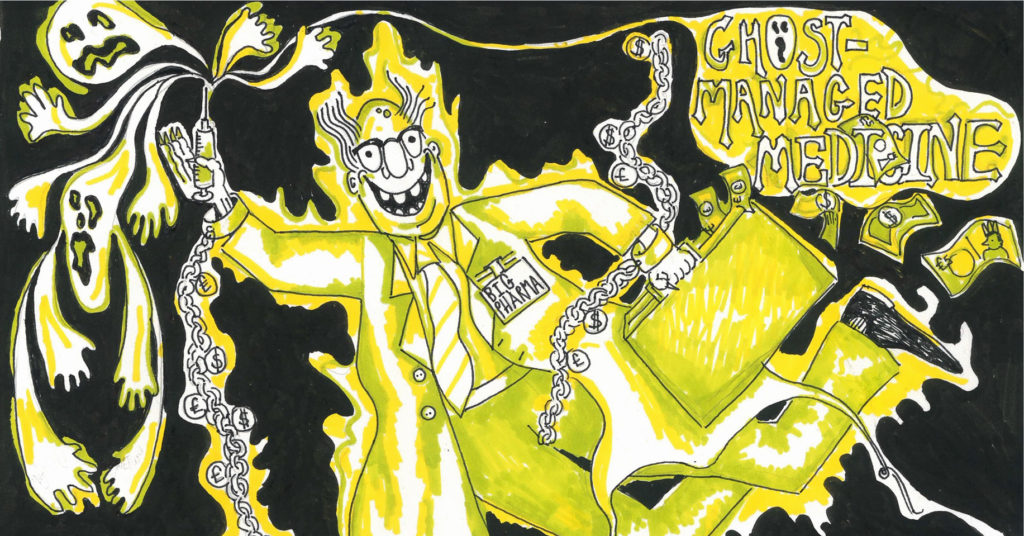
In this Q&A, editor Endre Dányi gives us a glimpse behind the scenes of the editing and production of Ghost Managed Medicine.
> What sparked your interest in Ghost Managed Medicine (GMM) when you read the proposal?
We really liked the idea of a book that focuses on an important and politically relevant topic through an STS lens but written for a wider audience. We also knew that Sergio would be able to pull this off – his writings are not only accessible, but also central to the STS canon. We had no doubt he’d be a great ‘ambassador’ for STS.
> What did you learn from GMM?
This is one of those stories where we as STS scholars and relatively well-informed citizens know that there are really dodgy things happening around big pharma, but being confronted with the actual mechanisms is still shocking. (A similar story for me was Cambridge Analytica and that secret recording where one of the leading figures of the company discussed their dirty campaign tricks.) It is quite terrifying that yes, sometimes reality is exactly as bad as we, cynical academics, tend to think.
> What surprised you in the editing process?
To be honest, I was surprised by how easy it was to work with Sergio. So far, this was probably our smoothest ride in terms of editing. For me, this experience shows how much wiggle room there is within academic publishing if authors know what’s possible.
> How did you decide who were the right peer reviewers for this book?
I think Sergio suggested one of the reviewers and I picked the other. We encourage our reviewers to sign their reviews, so that their initial comments on the proposal and the sample chapters can become part of a wider conversation that includes the author, some Mattering Press editors and the wider academic community.
> How do you decide when a book is ‘ready’ to be published?
After Sergio submitted the full manuscript, Uli Beisel and I read the text carefully and had a chat about some small edits that we thought were needed. The manuscript was ready pretty soon after that. Of course, that was only the beginning of a longer production process: copy-editing, proof reading, type-setting, and long discussions about cover design.
> How do you care for books after they have been published?
We don’t have the resources that are available to big university presses and commercial publishers, so we try to do as much ourselves as possible, with the help of our authors. Sergio and I did two launch events: one at EASST in Lancaster and one at 4S in Sydney, and we arranged a couple of book reviews. Social media is getting more and more important: we’ve been trying to be more present on Twitter, Facebook and Instagram, as well as on our website. Also, our collaboration with other Open Access presses in the ScholarLed consortium is aimed at making our books accessible in libraries all over the world.
> What do you feel proud about as the editor of GMM?
I’m honoured that Sergio approached us with his book idea back in 2016. We need this kind of trust and support, since Open Access publishers need to work harder than other presses to be taken seriously within various cultures of academic audit.
> How did you work with the other Mattering Press editors as part of the editorial process?
A few chats with Uli over the phone, and the regular editorial meetings with the rest of the group. Usually one or two of us are responsible for a book, but everyone else is involved in decision-making.
> Why is it important that this book is an open access monograph?
GMM is a bit of an experiment: it tests how well STS arguments work beyond the usual STS circles. Since the electronic versions of the text are available on our website for free, these arguments can travel faster and more easily than those in usual academic books. Many people who read GMM online decided to buy (the otherwise not too expensive) the paper copy, because they wanted to have it on their shelves. (Thanks to Julien McHardy’s fantastic cover design, it’s a really nice object to have!) It would be good to know more about how the book actually circulates – readers should feel free to send us their stories!
> On the Halloween theme, what scares you?
I fully share Jeremy Bentham’s take on ghosts: there would be nothing more reassuring than knowing that they are real. What makes the haunting figures of big pharma, but also of big petrol companies and other entities really scary, is that their thoroughly political activities are difficult to trace; they remain mostly ‘unreal’ and therefore unaccountable. Sergio’s is a very important undertaking in making some of the insidious mechanisms of manipulation visible. This doesn’t mean we automatically have the antidote, but at least we know how to identify the patterns.